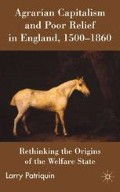Abstract
English poor relief dates from the sixteenth century. It was organized by the state and was funded through obligatory taxation. Benefits, typically in the form of money, were provided to those who could demonstrate sufficient financial need. Recipients of support lived, for the most part, not in workhouses but in their own homes. It is my contention that this method of delivering assistance to the poor was an anomaly; it had no equivalent in Europe until after c. 1840. In a pamphlet published more than 250 years ago, Thomas Alcock (1752, p. 21) highlighted the exceptional nature of the English case:
No nation, if we except the Jews, who had something of this kind in later times, ever allowed of a law to force charity. A strong argument this, that no such law ought to be allowed. For if the law had been right, and requisite, and necessary, many states and nations would long ago, no doubt, have adopted it. May not it seem very extraordinary then, that England should be the only nation that should ever have come into such a law? Are there not poor in other countries, as well as in this?
The objective of this book is to address an old question: Why was England’s system of poor relief unique, or why, in the words of Alcock, did the English alone have ‘a law to force charity’?
Whether you can observe a thing or not depends on the theory which you use.
Albert Einstein
We have to fracture old categories and to make new ones before we can ‘explain’ the evidence that has always been there.
E.P. Thompson
The proletariat is only beginning to form itself in Germany, as a result of the industrial movement. For what constitutes the proletariat is not naturally existing poverty, but poverty artificially produced, is not the mass of people mechanically oppressed by the weight of society, but the mass resulting from the disintegration of society.1
Karl Marx
Access this chapter
Tax calculation will be finalised at checkout
Purchases are for personal use only
Preview
Unable to display preview. Download preview PDF.
Copyright information
© 2007 Larry Patriquin
About this chapter
Cite this chapter
Patriquin, L. (2007). Introduction: The Extraordinary Case of a ‘Law to Force Charity’. In: Agrarian Capitalism and Poor Relief in England, 1500–1860. Palgrave Macmillan, London. https://doi.org/10.1057/9780230591387_1
Download citation
DOI: https://doi.org/10.1057/9780230591387_1
Publisher Name: Palgrave Macmillan, London
Print ISBN: 978-1-349-35472-6
Online ISBN: 978-0-230-59138-7
eBook Packages: Palgrave History CollectionHistory (R0)

